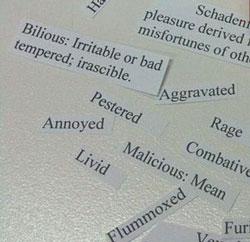In business we spend much of our time reading or writing. But no matter how experienced we are, few of us can write even half a page without agonising over how best to put our points across.

(Image: Wikimedia Commons)
The key to effective writing is to keep it simple. Make it readable and you'll find your message is understood first time.
Think about who your intended reader is and what it is that you are trying to say. Don't use language that will make your reader work unnecessarily hard to understand your message. It's not your opportunity to demonstrate your extensive vocabulary nor is it a chance to show off your great literary talent.
Clear writing reflects clear thinking
Writing is not usually something that we do for ourselves; it's nearly always aimed at creating a response in a reader. Some writers see writing as an opportunity to impress, showing how intellectual they can be and how expansive their vocabulary is, often at the expense of their readers' understanding. A simple direct message that's clear and to the point is easy for all to understand.
Effective writing is largely about simplicity of expression, accurate content and brief style.
The aim of writing
Always aim to be accurate and brief and to make your message clear. Structure your documents logically, and strive for effective, relevant and persuasive content. Use active rather than passive language:
A hit B describes the event more concisely than B was hit by A
You must have structure
Structure is the way you put your writing together - its arrangement. It acts a general plan.
When you've several points to make, decide what they are and in what order they should be.
Make a list of brief and explicit points and number them in logical order. These can also provide you with headings.
Once you're satisfied with your structure and headings then the battle for effective writing is already part won.
Remember that a poorly laid-out document suggests that the writer is disorganised and hasn't thought sufficiently about the purpose. It also suggests that the message contained in the document has not been properly thought through.
Don't worry about style
When writing business English, it's important to keep your reader firmly in mind. Don't be stuffy.
Use the language of everyday speech, not that of lawyers or bureaucrats. Pomposity and long-windedness tend to obscure meaning, or reveal the lack of it - strip them away in favour of plain words.
Write the way you speak. Talk to your reader. Pretend the person who'll read your document is sitting across from you, or that you're on the phone with him. Be informal. Relax.
Use plain language
Don't muddy your argument with corporate mumbo-jumbo. Be concise. Use short, simple words.
Plain language is all about being clear. It's communication that your reader can quickly and easily understand the first time they read it. It avoids verbose, convoluted language and jargon, and helps your reader act upon what they are reading.
By focusing on the reader and using simple words and short sentences, plain language writing reaches more people.
In short, plain language is a good writing style.
Use short sentences and short paragraphs
They're easier to read.
Your objective when writing effectively is to make it easy for your reader to get your message.
Poor writing often results from sentences being too long. Keep your sentences shorter than 15-20 words. Break long sentences into 2-3 smaller ones.
Paragraphs provide structure to your writing. The end of a paragraph gives a pause and lets your writing breath. Group sentences into paragraphs that all relate to the same idea, and be clear what your idea is.
Make it readable
Remember that the more technical or complicated something is to explain, the more simple your writing needs to be.
'Readability' is the term used to describe how difficult something is to read. It might surprise you that in South Africa the level for most appropriate business writing is between grade 7 and 11.
Keep it simple. You might then have a fair chance of being understood.







































